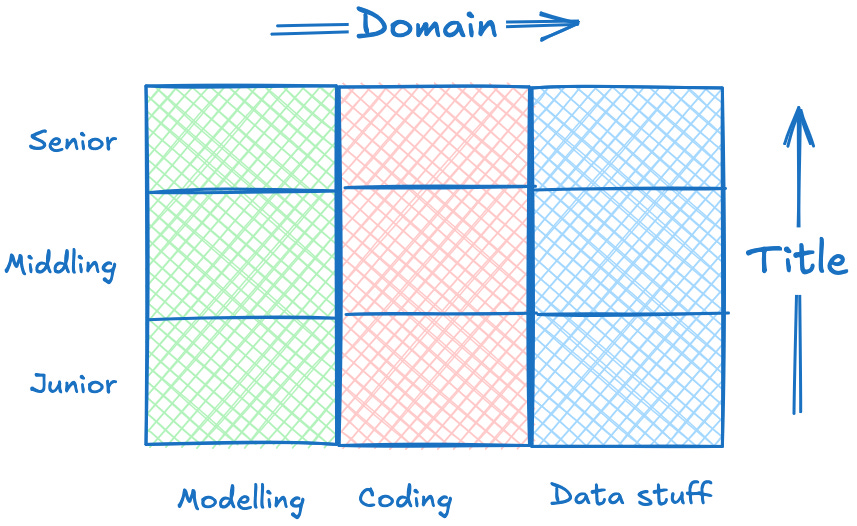Job Titles Are Lazy Labels
It's time to stop using simplistic labels for complex individuals
I’ve been working with a company in Belgium, helping them refine their team structures and development processes. This week, the topic turned to job titles. They asked what I thought about assigning titles like Junior Developer, Developer, and Senior Developer.
I recoiled. I wasn’t sure why—so I did what any self-respecting consultant does and deflected with a question:
“What’s your intent here?”
We want to give people a set of objective requirements for each role, in order to give them something to aim for.
“Could you give me some examples?”
Well, a junior developer on the modelling team has to be able to create and manipulate simple 3d objects in Blender, and they have to be able to perform basic image manipulation tasks in Photoshop.”
That clarified things. There wouldn’t be one set of requirements per role. Instead, each specialty—modeling, coding, and so on—would have its own separate expectations at each level.
So I got to thinking. Suppose there are half a dozen high-level requirements in each area: Junior/Modeling, Senior/Coding, and so on. What do you do with a modeler who’s world-class in Blender but hopeless in Photoshop? Are they a Junior because of the Photoshop gap? A Senior because of their Blender mastery? Or maybe a Middling Modeler because you couldn’t decide?
We Label People When We’re Too Lazy To Know Them
We live in a world where people are dropped into buckets based on labels: Republican/Democrat, Liverpool/Everton, Junior/Senior Developer. And that labeling encourages the insularity of opinion we see everywhere.
Reality is messier and more nuanced. Someone might align mostly with Republican values but support parts of the Democrat platform. A Liverpool fan might secretly admire a Toffee’s striker. And a so-called junior developer might already have senior-level skills in a niche area.
These high-level labels are a management convenience. But they shortchange both the individual and the organization.
What If We Gamified It?
On the call, I suggested an alternative to these blanket titles. I asked if they could go back to their original requirements and break them down into individual skill challenges: Basic Blender, Photoshop Novice, Blender Wizard, and so on.
Each challenge would have specific, objective criteria. And when someone completed one, they’d earn a badge, trophy, or silly award. Over time, folks would collect trophies across specialties and levels—physical tokens they could display on their desk or laptop.
You could even lean into the game aspect. Every quarter, host a light-hearted showdown: two Photoshop Wizards go head-to-head on a tricky challenge, with their screens projected for all to see. A bit of fun—and a great way to pick up new tricks.
To my surprise, they jumped at this idea. They’re now rethinking the Junior/Mid/Senior hierarchy, replacing it with individual skill tracks. Their new system has three goals:
Identify people’s actual skills, so projects can tap into the right talent.
Create personalized career paths, instead of promoting people based on checklists.
Encourage learning through playful competition, sparking curiosity and motivation.
It will be interesting to see how that works out over the coming year.
What do you think?
Facing an interesting challenge? I’m at dave@pragdave.me




I think it always depends on the purpose people are trying to achieve here. It helps to solve the problem of creating a team that is capable of taking a project by making the available skills transparent, and it also helps with knowledge sharing.
On the other hand, if the company is using this titles mainly for evaluating how much each person should earn as a salary, this can quickly snowball into a larger discussion. Which, by the way, can be a very interesting one, but maybe one the company is not ready or willing to face at the moment.
I feel there is a bit of paradox. To avoid reducing people into some broad categories this multi-label approach takes even more reductive swing (as in philosophical reductionism) to deconstruct people value even more.